Tesco's Global Expansion and Exit Strategy: South Korea Case Study
VerifiedAdded on 2020/07/22
|8
|2559
|109
Report
AI Summary
This report provides a comprehensive analysis of Tesco's global expansion strategy, with a particular focus on its experiences in South Korea. It begins by examining the drivers of globalization that influenced Tesco's expansion into Asia, including technological innovation, developments in transportation, and social, political, and economic reforms. The report then explores Tesco's performance in the South Korean market, highlighting the factors that contributed to its success, such as its adaptation to local culture and its partnership with Samsung. However, the report also delves into the reasons behind Tesco's eventual decision to exit the South Korean market, including political drivers, cost considerations, and changes in the business landscape. Finally, the report concludes by summarizing the key factors that influenced Tesco's decision-making process and providing insights into the challenges and opportunities of global retail expansion. The report also examines the reasons behind Tesco's exit from South Korea, including higher debt burdens, the dissolution of its partnership with Samsung, and government support for local businesses. The report concludes with a summary of the key factors that influenced Tesco's strategic decisions and provides insights into the complexities of global retail expansion.
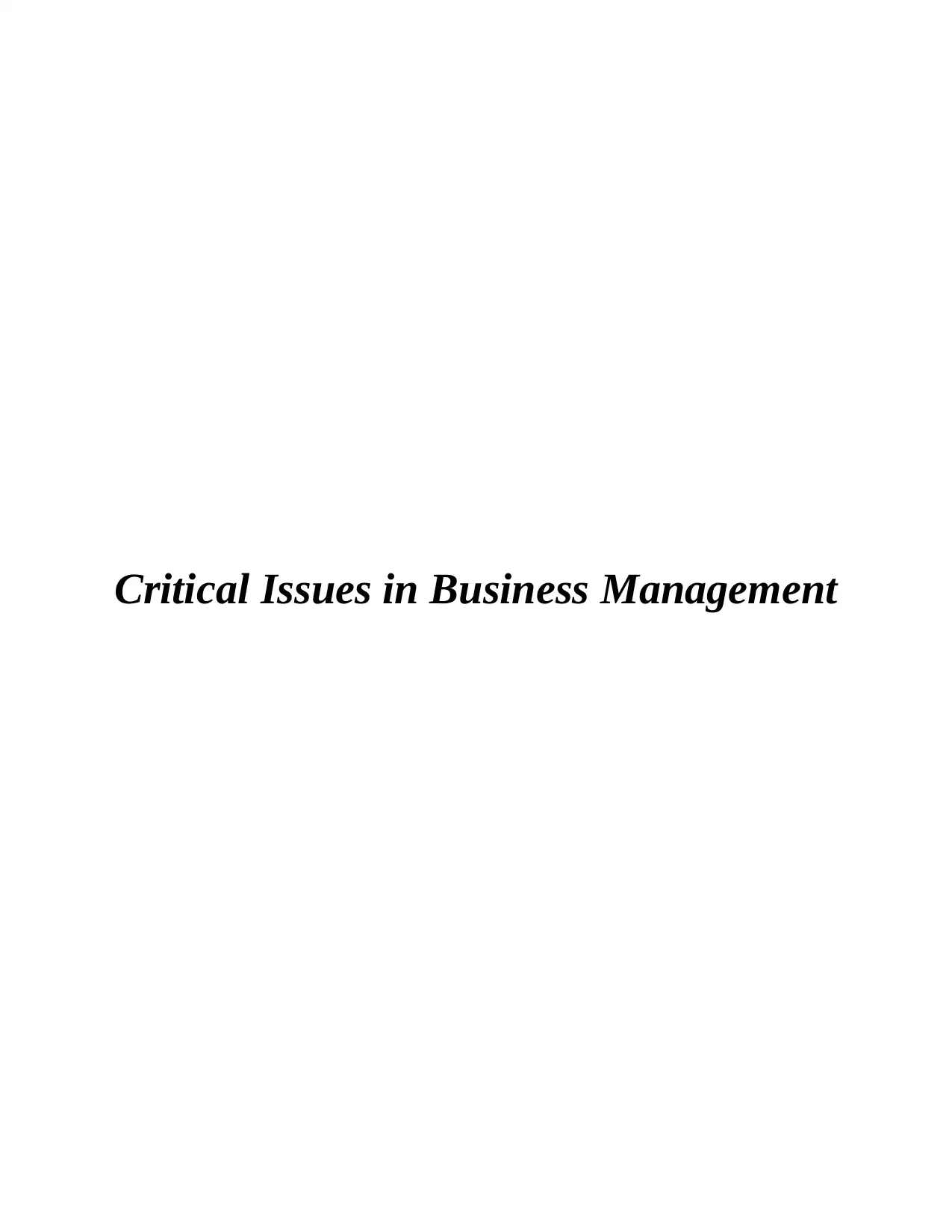
Critical Issues in Business Management
Paraphrase This Document
Need a fresh take? Get an instant paraphrase of this document with our AI Paraphraser
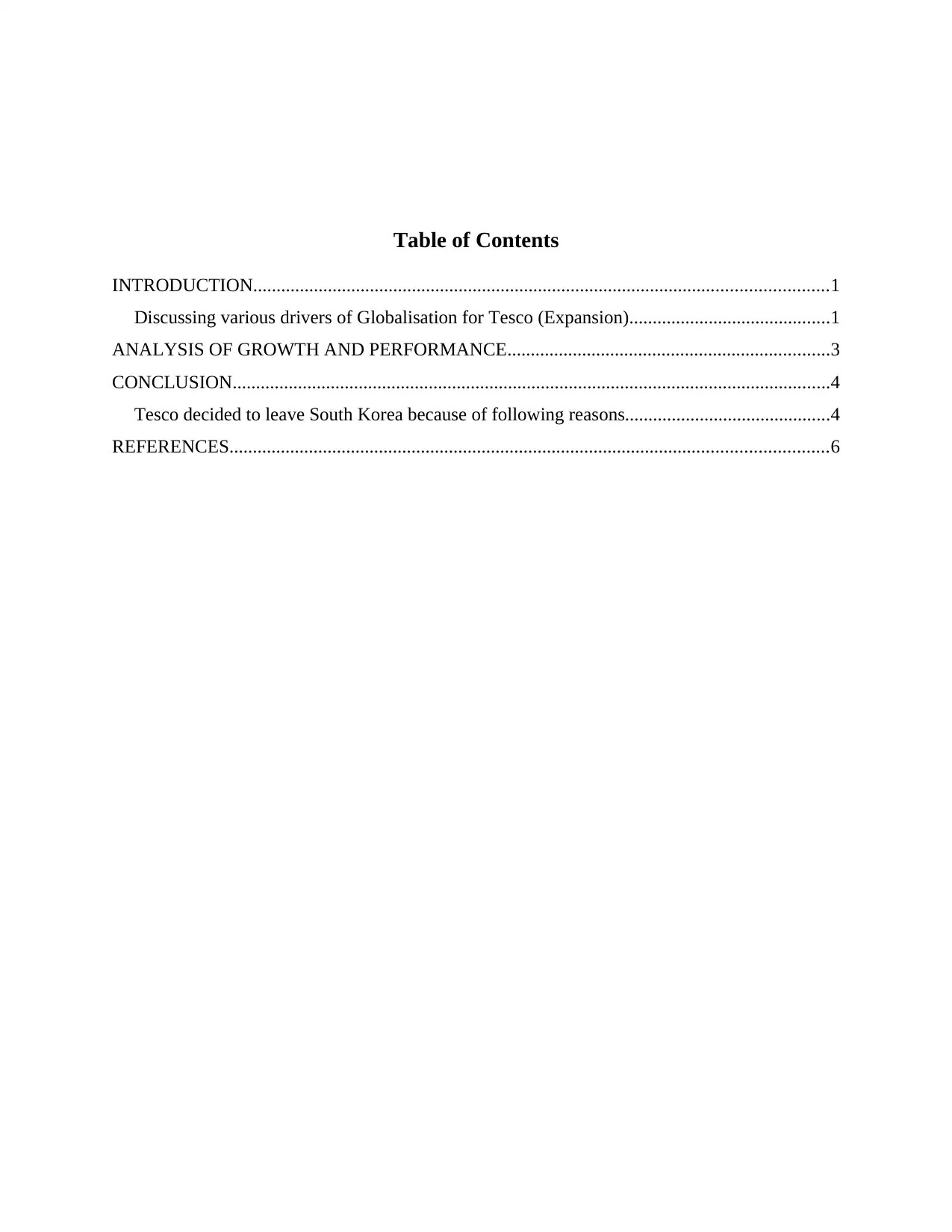
Table of Contents
INTRODUCTION...........................................................................................................................1
Discussing various drivers of Globalisation for Tesco (Expansion)...........................................1
ANALYSIS OF GROWTH AND PERFORMANCE.....................................................................3
CONCLUSION................................................................................................................................4
Tesco decided to leave South Korea because of following reasons............................................4
REFERENCES................................................................................................................................6
INTRODUCTION...........................................................................................................................1
Discussing various drivers of Globalisation for Tesco (Expansion)...........................................1
ANALYSIS OF GROWTH AND PERFORMANCE.....................................................................3
CONCLUSION................................................................................................................................4
Tesco decided to leave South Korea because of following reasons............................................4
REFERENCES................................................................................................................................6
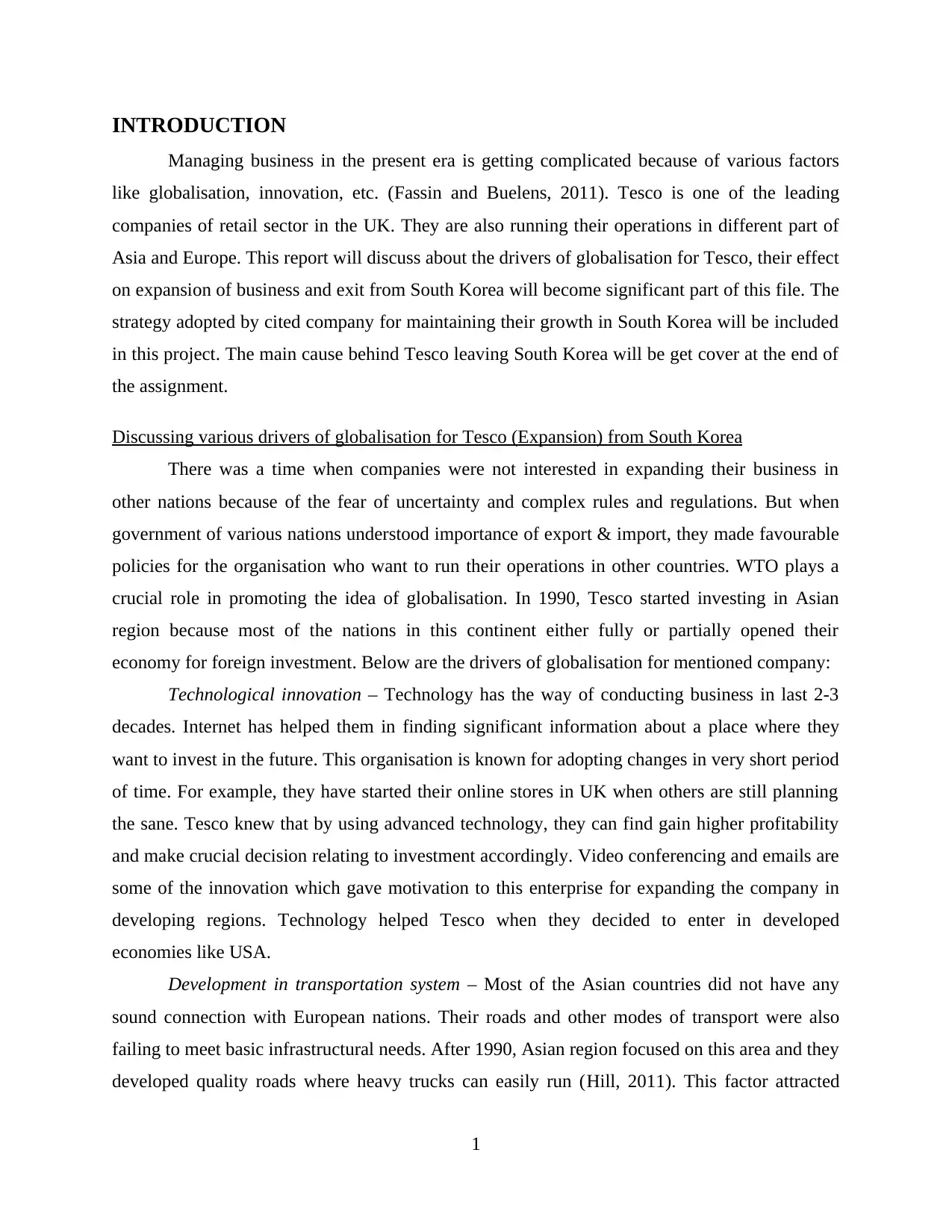
INTRODUCTION
Managing business in the present era is getting complicated because of various factors
like globalisation, innovation, etc. (Fassin and Buelens, 2011). Tesco is one of the leading
companies of retail sector in the UK. They are also running their operations in different part of
Asia and Europe. This report will discuss about the drivers of globalisation for Tesco, their effect
on expansion of business and exit from South Korea will become significant part of this file. The
strategy adopted by cited company for maintaining their growth in South Korea will be included
in this project. The main cause behind Tesco leaving South Korea will be get cover at the end of
the assignment.
Discussing various drivers of globalisation for Tesco (Expansion) from South Korea
There was a time when companies were not interested in expanding their business in
other nations because of the fear of uncertainty and complex rules and regulations. But when
government of various nations understood importance of export & import, they made favourable
policies for the organisation who want to run their operations in other countries. WTO plays a
crucial role in promoting the idea of globalisation. In 1990, Tesco started investing in Asian
region because most of the nations in this continent either fully or partially opened their
economy for foreign investment. Below are the drivers of globalisation for mentioned company:
Technological innovation – Technology has the way of conducting business in last 2-3
decades. Internet has helped them in finding significant information about a place where they
want to invest in the future. This organisation is known for adopting changes in very short period
of time. For example, they have started their online stores in UK when others are still planning
the sane. Tesco knew that by using advanced technology, they can find gain higher profitability
and make crucial decision relating to investment accordingly. Video conferencing and emails are
some of the innovation which gave motivation to this enterprise for expanding the company in
developing regions. Technology helped Tesco when they decided to enter in developed
economies like USA.
Development in transportation system – Most of the Asian countries did not have any
sound connection with European nations. Their roads and other modes of transport were also
failing to meet basic infrastructural needs. After 1990, Asian region focused on this area and they
developed quality roads where heavy trucks can easily run (Hill, 2011). This factor attracted
1
Managing business in the present era is getting complicated because of various factors
like globalisation, innovation, etc. (Fassin and Buelens, 2011). Tesco is one of the leading
companies of retail sector in the UK. They are also running their operations in different part of
Asia and Europe. This report will discuss about the drivers of globalisation for Tesco, their effect
on expansion of business and exit from South Korea will become significant part of this file. The
strategy adopted by cited company for maintaining their growth in South Korea will be included
in this project. The main cause behind Tesco leaving South Korea will be get cover at the end of
the assignment.
Discussing various drivers of globalisation for Tesco (Expansion) from South Korea
There was a time when companies were not interested in expanding their business in
other nations because of the fear of uncertainty and complex rules and regulations. But when
government of various nations understood importance of export & import, they made favourable
policies for the organisation who want to run their operations in other countries. WTO plays a
crucial role in promoting the idea of globalisation. In 1990, Tesco started investing in Asian
region because most of the nations in this continent either fully or partially opened their
economy for foreign investment. Below are the drivers of globalisation for mentioned company:
Technological innovation – Technology has the way of conducting business in last 2-3
decades. Internet has helped them in finding significant information about a place where they
want to invest in the future. This organisation is known for adopting changes in very short period
of time. For example, they have started their online stores in UK when others are still planning
the sane. Tesco knew that by using advanced technology, they can find gain higher profitability
and make crucial decision relating to investment accordingly. Video conferencing and emails are
some of the innovation which gave motivation to this enterprise for expanding the company in
developing regions. Technology helped Tesco when they decided to enter in developed
economies like USA.
Development in transportation system – Most of the Asian countries did not have any
sound connection with European nations. Their roads and other modes of transport were also
failing to meet basic infrastructural needs. After 1990, Asian region focused on this area and they
developed quality roads where heavy trucks can easily run (Hill, 2011). This factor attracted
1
⊘ This is a preview!⊘
Do you want full access?
Subscribe today to unlock all pages.

Trusted by 1+ million students worldwide
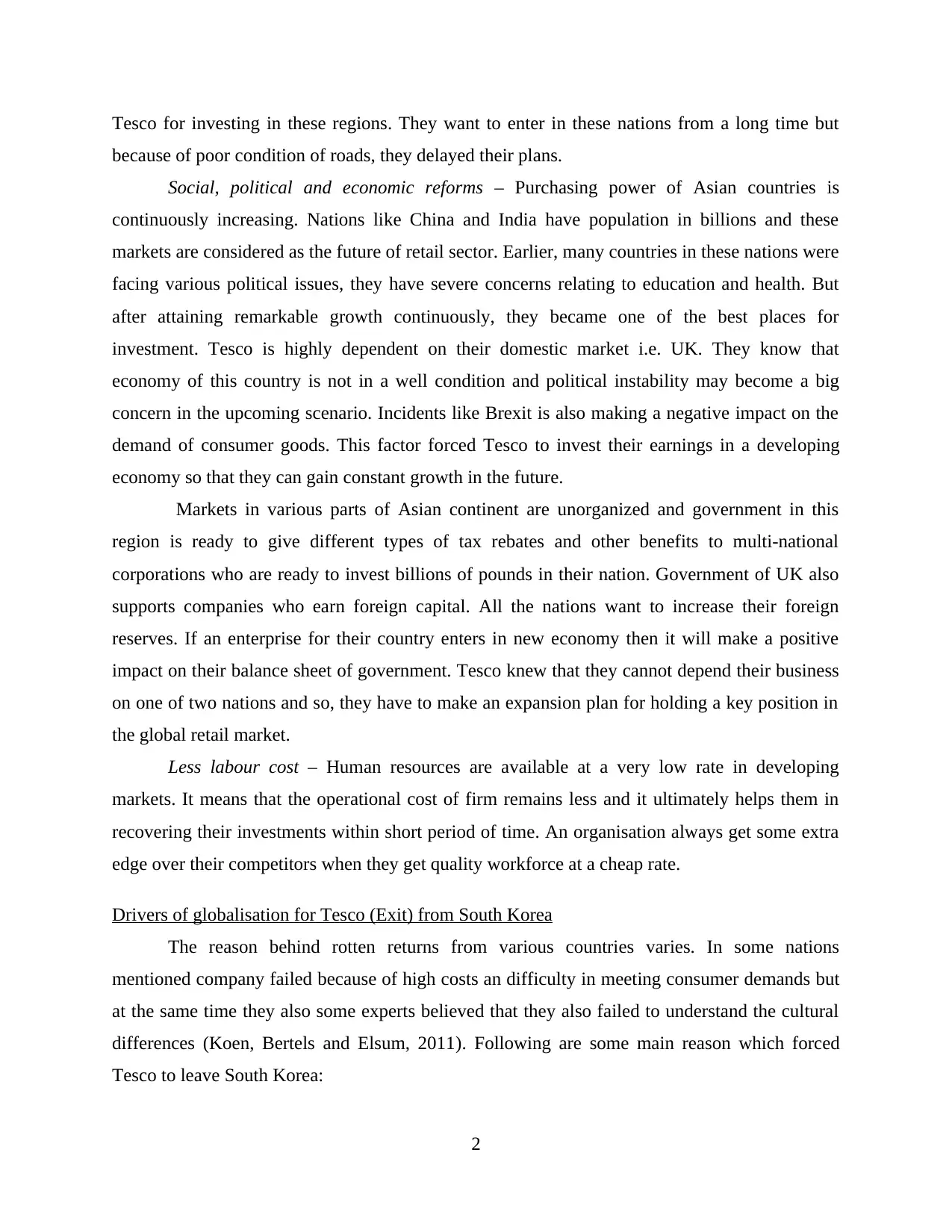
Tesco for investing in these regions. They want to enter in these nations from a long time but
because of poor condition of roads, they delayed their plans.
Social, political and economic reforms – Purchasing power of Asian countries is
continuously increasing. Nations like China and India have population in billions and these
markets are considered as the future of retail sector. Earlier, many countries in these nations were
facing various political issues, they have severe concerns relating to education and health. But
after attaining remarkable growth continuously, they became one of the best places for
investment. Tesco is highly dependent on their domestic market i.e. UK. They know that
economy of this country is not in a well condition and political instability may become a big
concern in the upcoming scenario. Incidents like Brexit is also making a negative impact on the
demand of consumer goods. This factor forced Tesco to invest their earnings in a developing
economy so that they can gain constant growth in the future.
Markets in various parts of Asian continent are unorganized and government in this
region is ready to give different types of tax rebates and other benefits to multi-national
corporations who are ready to invest billions of pounds in their nation. Government of UK also
supports companies who earn foreign capital. All the nations want to increase their foreign
reserves. If an enterprise for their country enters in new economy then it will make a positive
impact on their balance sheet of government. Tesco knew that they cannot depend their business
on one of two nations and so, they have to make an expansion plan for holding a key position in
the global retail market.
Less labour cost – Human resources are available at a very low rate in developing
markets. It means that the operational cost of firm remains less and it ultimately helps them in
recovering their investments within short period of time. An organisation always get some extra
edge over their competitors when they get quality workforce at a cheap rate.
Drivers of globalisation for Tesco (Exit) from South Korea
The reason behind rotten returns from various countries varies. In some nations
mentioned company failed because of high costs an difficulty in meeting consumer demands but
at the same time they also some experts believed that they also failed to understand the cultural
differences (Koen, Bertels and Elsum, 2011). Following are some main reason which forced
Tesco to leave South Korea:
2
because of poor condition of roads, they delayed their plans.
Social, political and economic reforms – Purchasing power of Asian countries is
continuously increasing. Nations like China and India have population in billions and these
markets are considered as the future of retail sector. Earlier, many countries in these nations were
facing various political issues, they have severe concerns relating to education and health. But
after attaining remarkable growth continuously, they became one of the best places for
investment. Tesco is highly dependent on their domestic market i.e. UK. They know that
economy of this country is not in a well condition and political instability may become a big
concern in the upcoming scenario. Incidents like Brexit is also making a negative impact on the
demand of consumer goods. This factor forced Tesco to invest their earnings in a developing
economy so that they can gain constant growth in the future.
Markets in various parts of Asian continent are unorganized and government in this
region is ready to give different types of tax rebates and other benefits to multi-national
corporations who are ready to invest billions of pounds in their nation. Government of UK also
supports companies who earn foreign capital. All the nations want to increase their foreign
reserves. If an enterprise for their country enters in new economy then it will make a positive
impact on their balance sheet of government. Tesco knew that they cannot depend their business
on one of two nations and so, they have to make an expansion plan for holding a key position in
the global retail market.
Less labour cost – Human resources are available at a very low rate in developing
markets. It means that the operational cost of firm remains less and it ultimately helps them in
recovering their investments within short period of time. An organisation always get some extra
edge over their competitors when they get quality workforce at a cheap rate.
Drivers of globalisation for Tesco (Exit) from South Korea
The reason behind rotten returns from various countries varies. In some nations
mentioned company failed because of high costs an difficulty in meeting consumer demands but
at the same time they also some experts believed that they also failed to understand the cultural
differences (Koen, Bertels and Elsum, 2011). Following are some main reason which forced
Tesco to leave South Korea:
2
Paraphrase This Document
Need a fresh take? Get an instant paraphrase of this document with our AI Paraphraser
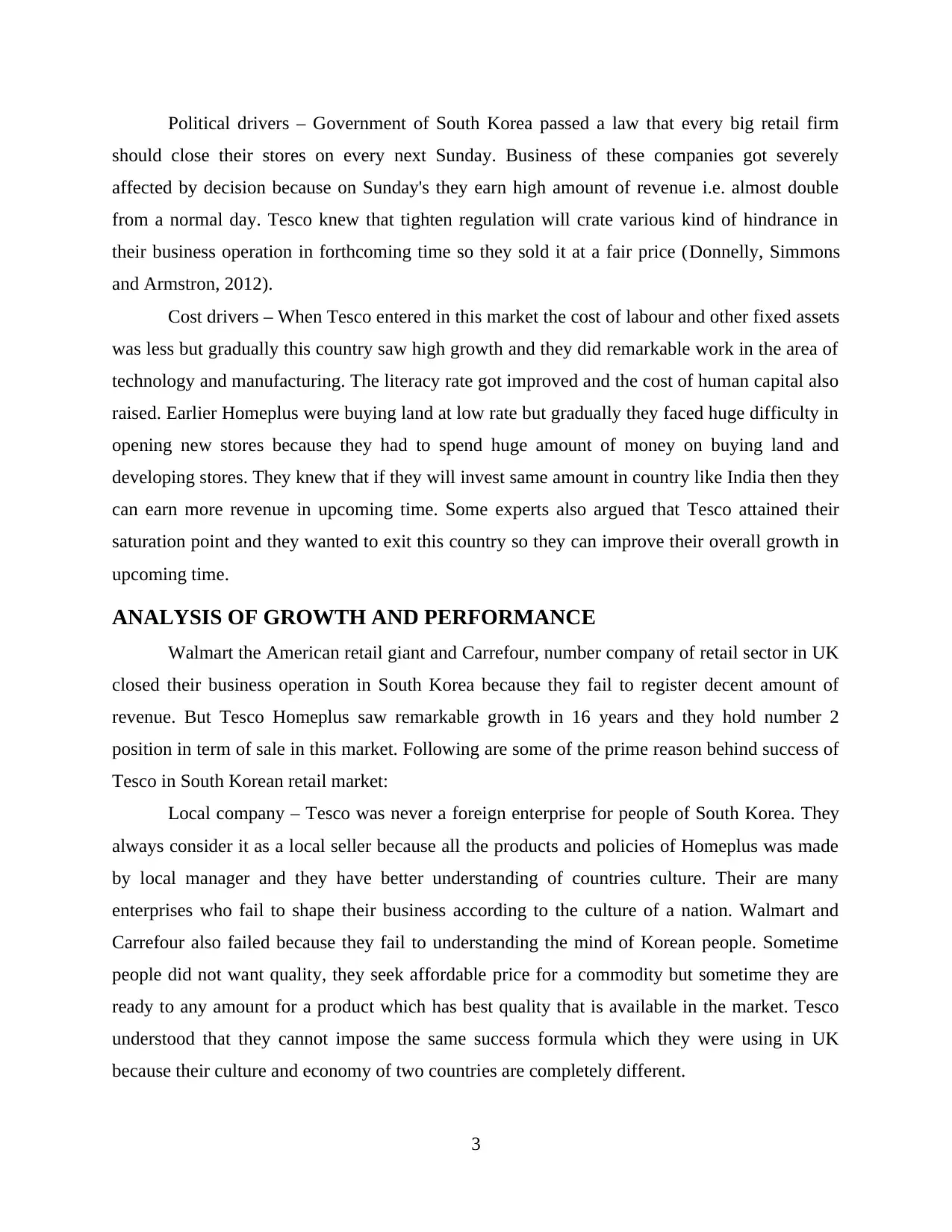
Political drivers – Government of South Korea passed a law that every big retail firm
should close their stores on every next Sunday. Business of these companies got severely
affected by decision because on Sunday's they earn high amount of revenue i.e. almost double
from a normal day. Tesco knew that tighten regulation will crate various kind of hindrance in
their business operation in forthcoming time so they sold it at a fair price (Donnelly, Simmons
and Armstron, 2012).
Cost drivers – When Tesco entered in this market the cost of labour and other fixed assets
was less but gradually this country saw high growth and they did remarkable work in the area of
technology and manufacturing. The literacy rate got improved and the cost of human capital also
raised. Earlier Homeplus were buying land at low rate but gradually they faced huge difficulty in
opening new stores because they had to spend huge amount of money on buying land and
developing stores. They knew that if they will invest same amount in country like India then they
can earn more revenue in upcoming time. Some experts also argued that Tesco attained their
saturation point and they wanted to exit this country so they can improve their overall growth in
upcoming time.
ANALYSIS OF GROWTH AND PERFORMANCE
Walmart the American retail giant and Carrefour, number company of retail sector in UK
closed their business operation in South Korea because they fail to register decent amount of
revenue. But Tesco Homeplus saw remarkable growth in 16 years and they hold number 2
position in term of sale in this market. Following are some of the prime reason behind success of
Tesco in South Korean retail market:
Local company – Tesco was never a foreign enterprise for people of South Korea. They
always consider it as a local seller because all the products and policies of Homeplus was made
by local manager and they have better understanding of countries culture. Their are many
enterprises who fail to shape their business according to the culture of a nation. Walmart and
Carrefour also failed because they fail to understanding the mind of Korean people. Sometime
people did not want quality, they seek affordable price for a commodity but sometime they are
ready to any amount for a product which has best quality that is available in the market. Tesco
understood that they cannot impose the same success formula which they were using in UK
because their culture and economy of two countries are completely different.
3
should close their stores on every next Sunday. Business of these companies got severely
affected by decision because on Sunday's they earn high amount of revenue i.e. almost double
from a normal day. Tesco knew that tighten regulation will crate various kind of hindrance in
their business operation in forthcoming time so they sold it at a fair price (Donnelly, Simmons
and Armstron, 2012).
Cost drivers – When Tesco entered in this market the cost of labour and other fixed assets
was less but gradually this country saw high growth and they did remarkable work in the area of
technology and manufacturing. The literacy rate got improved and the cost of human capital also
raised. Earlier Homeplus were buying land at low rate but gradually they faced huge difficulty in
opening new stores because they had to spend huge amount of money on buying land and
developing stores. They knew that if they will invest same amount in country like India then they
can earn more revenue in upcoming time. Some experts also argued that Tesco attained their
saturation point and they wanted to exit this country so they can improve their overall growth in
upcoming time.
ANALYSIS OF GROWTH AND PERFORMANCE
Walmart the American retail giant and Carrefour, number company of retail sector in UK
closed their business operation in South Korea because they fail to register decent amount of
revenue. But Tesco Homeplus saw remarkable growth in 16 years and they hold number 2
position in term of sale in this market. Following are some of the prime reason behind success of
Tesco in South Korean retail market:
Local company – Tesco was never a foreign enterprise for people of South Korea. They
always consider it as a local seller because all the products and policies of Homeplus was made
by local manager and they have better understanding of countries culture. Their are many
enterprises who fail to shape their business according to the culture of a nation. Walmart and
Carrefour also failed because they fail to understanding the mind of Korean people. Sometime
people did not want quality, they seek affordable price for a commodity but sometime they are
ready to any amount for a product which has best quality that is available in the market. Tesco
understood that they cannot impose the same success formula which they were using in UK
because their culture and economy of two countries are completely different.
3
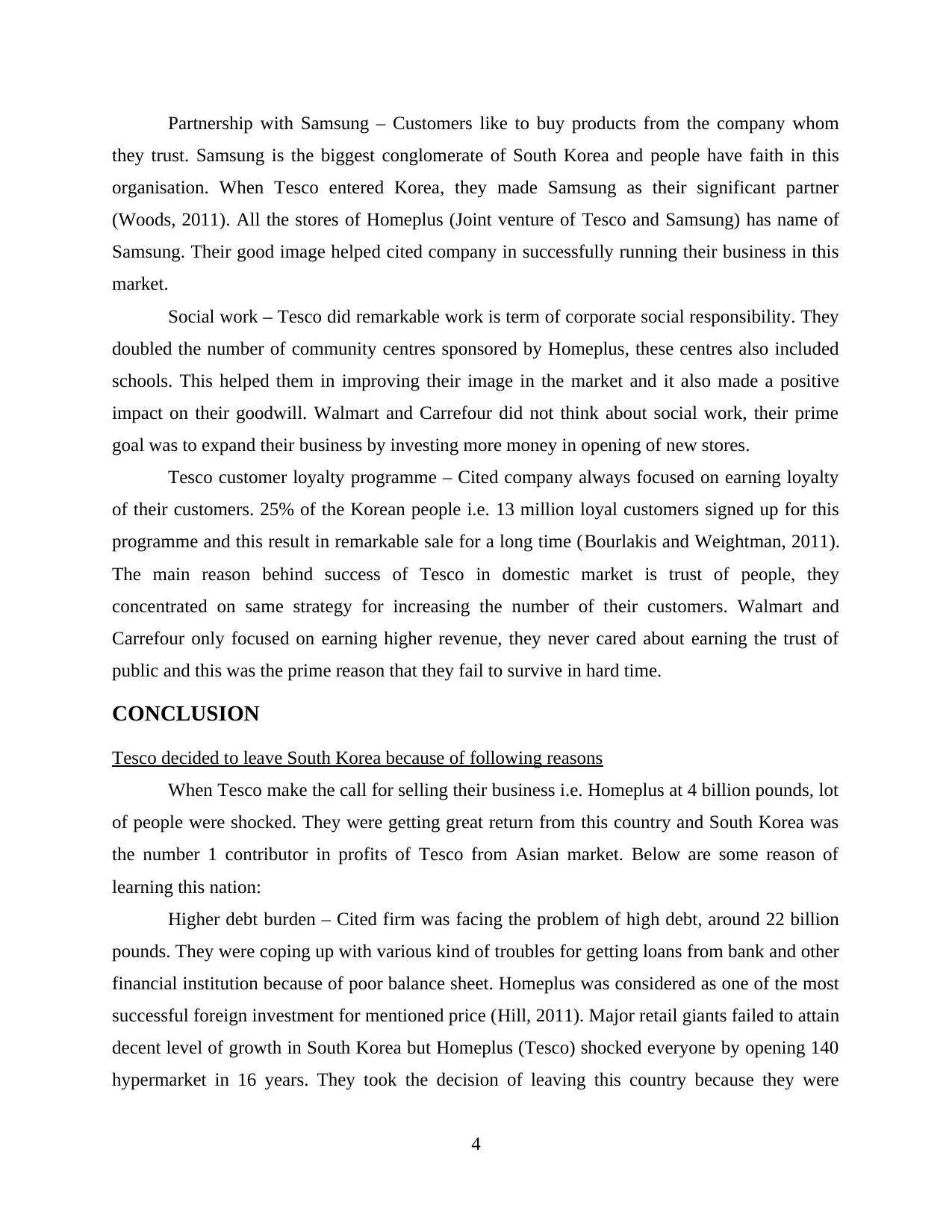
Partnership with Samsung – Customers like to buy products from the company whom
they trust. Samsung is the biggest conglomerate of South Korea and people have faith in this
organisation. When Tesco entered Korea, they made Samsung as their significant partner
(Woods, 2011). All the stores of Homeplus (Joint venture of Tesco and Samsung) has name of
Samsung. Their good image helped cited company in successfully running their business in this
market.
Social work – Tesco did remarkable work is term of corporate social responsibility. They
doubled the number of community centres sponsored by Homeplus, these centres also included
schools. This helped them in improving their image in the market and it also made a positive
impact on their goodwill. Walmart and Carrefour did not think about social work, their prime
goal was to expand their business by investing more money in opening of new stores.
Tesco customer loyalty programme – Cited company always focused on earning loyalty
of their customers. 25% of the Korean people i.e. 13 million loyal customers signed up for this
programme and this result in remarkable sale for a long time (Bourlakis and Weightman, 2011).
The main reason behind success of Tesco in domestic market is trust of people, they
concentrated on same strategy for increasing the number of their customers. Walmart and
Carrefour only focused on earning higher revenue, they never cared about earning the trust of
public and this was the prime reason that they fail to survive in hard time.
CONCLUSION
Tesco decided to leave South Korea because of following reasons
When Tesco make the call for selling their business i.e. Homeplus at 4 billion pounds, lot
of people were shocked. They were getting great return from this country and South Korea was
the number 1 contributor in profits of Tesco from Asian market. Below are some reason of
learning this nation:
Higher debt burden – Cited firm was facing the problem of high debt, around 22 billion
pounds. They were coping up with various kind of troubles for getting loans from bank and other
financial institution because of poor balance sheet. Homeplus was considered as one of the most
successful foreign investment for mentioned price (Hill, 2011). Major retail giants failed to attain
decent level of growth in South Korea but Homeplus (Tesco) shocked everyone by opening 140
hypermarket in 16 years. They took the decision of leaving this country because they were
4
they trust. Samsung is the biggest conglomerate of South Korea and people have faith in this
organisation. When Tesco entered Korea, they made Samsung as their significant partner
(Woods, 2011). All the stores of Homeplus (Joint venture of Tesco and Samsung) has name of
Samsung. Their good image helped cited company in successfully running their business in this
market.
Social work – Tesco did remarkable work is term of corporate social responsibility. They
doubled the number of community centres sponsored by Homeplus, these centres also included
schools. This helped them in improving their image in the market and it also made a positive
impact on their goodwill. Walmart and Carrefour did not think about social work, their prime
goal was to expand their business by investing more money in opening of new stores.
Tesco customer loyalty programme – Cited company always focused on earning loyalty
of their customers. 25% of the Korean people i.e. 13 million loyal customers signed up for this
programme and this result in remarkable sale for a long time (Bourlakis and Weightman, 2011).
The main reason behind success of Tesco in domestic market is trust of people, they
concentrated on same strategy for increasing the number of their customers. Walmart and
Carrefour only focused on earning higher revenue, they never cared about earning the trust of
public and this was the prime reason that they fail to survive in hard time.
CONCLUSION
Tesco decided to leave South Korea because of following reasons
When Tesco make the call for selling their business i.e. Homeplus at 4 billion pounds, lot
of people were shocked. They were getting great return from this country and South Korea was
the number 1 contributor in profits of Tesco from Asian market. Below are some reason of
learning this nation:
Higher debt burden – Cited firm was facing the problem of high debt, around 22 billion
pounds. They were coping up with various kind of troubles for getting loans from bank and other
financial institution because of poor balance sheet. Homeplus was considered as one of the most
successful foreign investment for mentioned price (Hill, 2011). Major retail giants failed to attain
decent level of growth in South Korea but Homeplus (Tesco) shocked everyone by opening 140
hypermarket in 16 years. They took the decision of leaving this country because they were
4
⊘ This is a preview!⊘
Do you want full access?
Subscribe today to unlock all pages.

Trusted by 1+ million students worldwide
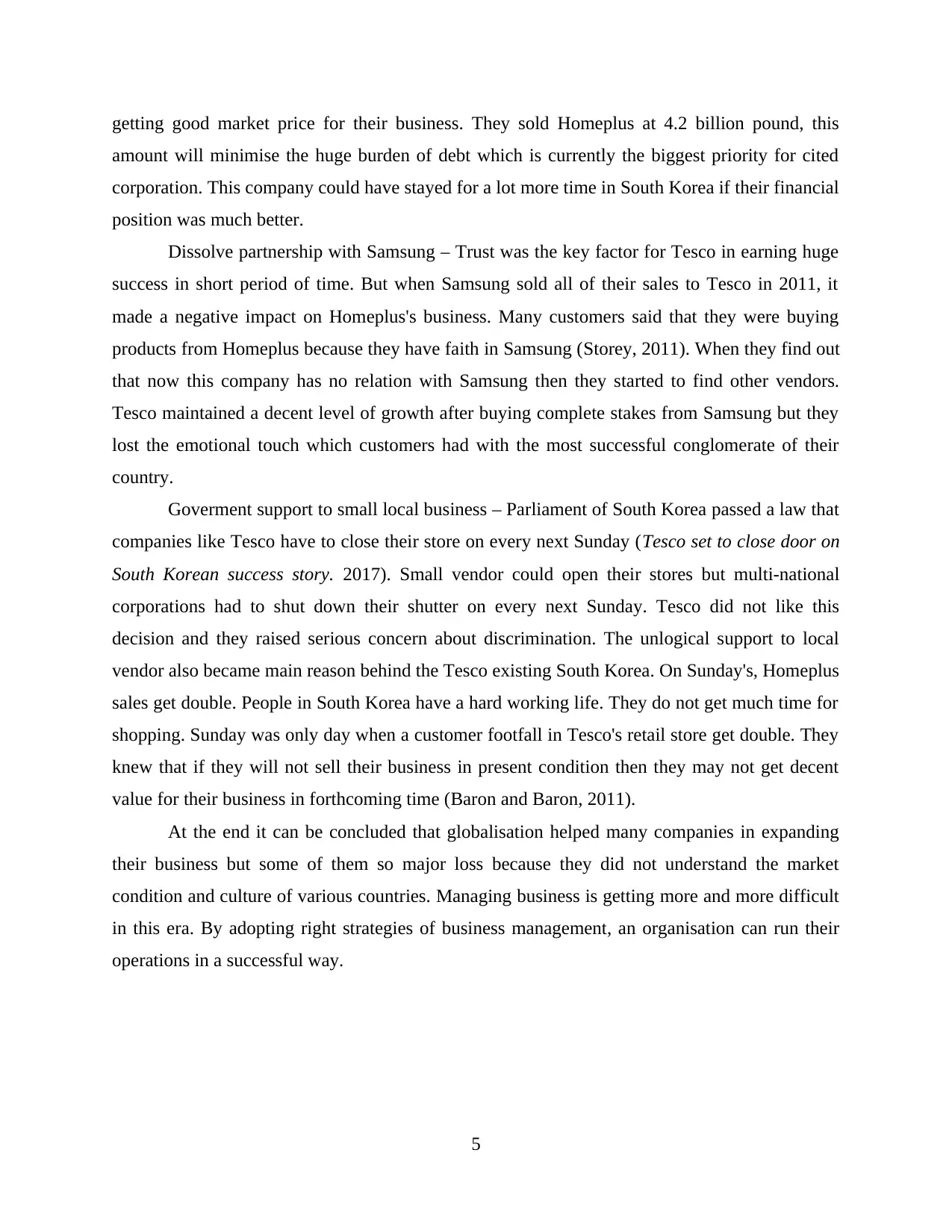
getting good market price for their business. They sold Homeplus at 4.2 billion pound, this
amount will minimise the huge burden of debt which is currently the biggest priority for cited
corporation. This company could have stayed for a lot more time in South Korea if their financial
position was much better.
Dissolve partnership with Samsung – Trust was the key factor for Tesco in earning huge
success in short period of time. But when Samsung sold all of their sales to Tesco in 2011, it
made a negative impact on Homeplus's business. Many customers said that they were buying
products from Homeplus because they have faith in Samsung (Storey, 2011). When they find out
that now this company has no relation with Samsung then they started to find other vendors.
Tesco maintained a decent level of growth after buying complete stakes from Samsung but they
lost the emotional touch which customers had with the most successful conglomerate of their
country.
Goverment support to small local business – Parliament of South Korea passed a law that
companies like Tesco have to close their store on every next Sunday (Tesco set to close door on
South Korean success story. 2017). Small vendor could open their stores but multi-national
corporations had to shut down their shutter on every next Sunday. Tesco did not like this
decision and they raised serious concern about discrimination. The unlogical support to local
vendor also became main reason behind the Tesco existing South Korea. On Sunday's, Homeplus
sales get double. People in South Korea have a hard working life. They do not get much time for
shopping. Sunday was only day when a customer footfall in Tesco's retail store get double. They
knew that if they will not sell their business in present condition then they may not get decent
value for their business in forthcoming time (Baron and Baron, 2011).
At the end it can be concluded that globalisation helped many companies in expanding
their business but some of them so major loss because they did not understand the market
condition and culture of various countries. Managing business is getting more and more difficult
in this era. By adopting right strategies of business management, an organisation can run their
operations in a successful way.
5
amount will minimise the huge burden of debt which is currently the biggest priority for cited
corporation. This company could have stayed for a lot more time in South Korea if their financial
position was much better.
Dissolve partnership with Samsung – Trust was the key factor for Tesco in earning huge
success in short period of time. But when Samsung sold all of their sales to Tesco in 2011, it
made a negative impact on Homeplus's business. Many customers said that they were buying
products from Homeplus because they have faith in Samsung (Storey, 2011). When they find out
that now this company has no relation with Samsung then they started to find other vendors.
Tesco maintained a decent level of growth after buying complete stakes from Samsung but they
lost the emotional touch which customers had with the most successful conglomerate of their
country.
Goverment support to small local business – Parliament of South Korea passed a law that
companies like Tesco have to close their store on every next Sunday (Tesco set to close door on
South Korean success story. 2017). Small vendor could open their stores but multi-national
corporations had to shut down their shutter on every next Sunday. Tesco did not like this
decision and they raised serious concern about discrimination. The unlogical support to local
vendor also became main reason behind the Tesco existing South Korea. On Sunday's, Homeplus
sales get double. People in South Korea have a hard working life. They do not get much time for
shopping. Sunday was only day when a customer footfall in Tesco's retail store get double. They
knew that if they will not sell their business in present condition then they may not get decent
value for their business in forthcoming time (Baron and Baron, 2011).
At the end it can be concluded that globalisation helped many companies in expanding
their business but some of them so major loss because they did not understand the market
condition and culture of various countries. Managing business is getting more and more difficult
in this era. By adopting right strategies of business management, an organisation can run their
operations in a successful way.
5
Paraphrase This Document
Need a fresh take? Get an instant paraphrase of this document with our AI Paraphraser
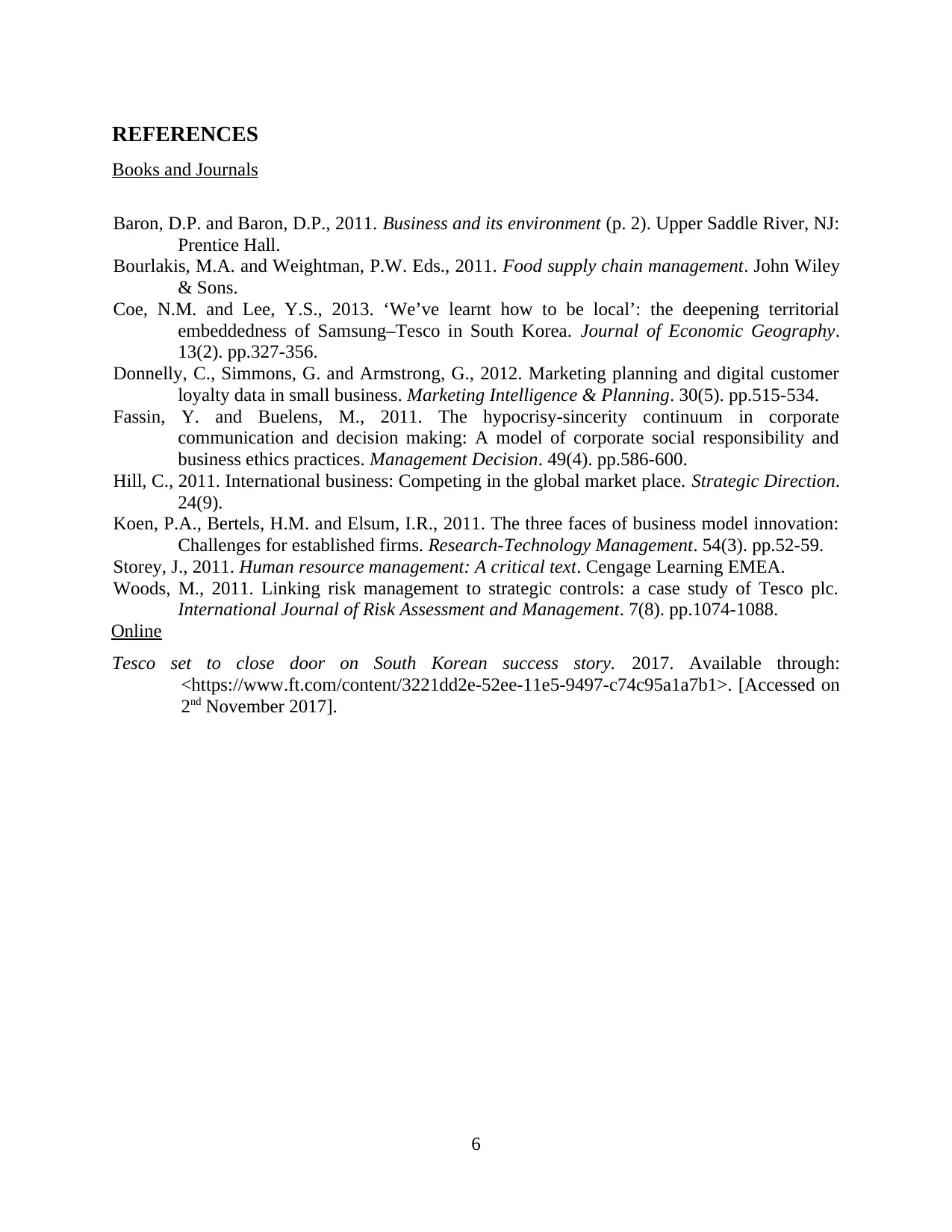
REFERENCES
Books and Journals
Baron, D.P. and Baron, D.P., 2011. Business and its environment (p. 2). Upper Saddle River, NJ:
Prentice Hall.
Bourlakis, M.A. and Weightman, P.W. Eds., 2011. Food supply chain management. John Wiley
& Sons.
Coe, N.M. and Lee, Y.S., 2013. ‘We’ve learnt how to be local’: the deepening territorial
embeddedness of Samsung–Tesco in South Korea. Journal of Economic Geography.
13(2). pp.327-356.
Donnelly, C., Simmons, G. and Armstrong, G., 2012. Marketing planning and digital customer
loyalty data in small business. Marketing Intelligence & Planning. 30(5). pp.515-534.
Fassin, Y. and Buelens, M., 2011. The hypocrisy-sincerity continuum in corporate
communication and decision making: A model of corporate social responsibility and
business ethics practices. Management Decision. 49(4). pp.586-600.
Hill, C., 2011. International business: Competing in the global market place. Strategic Direction.
24(9).
Koen, P.A., Bertels, H.M. and Elsum, I.R., 2011. The three faces of business model innovation:
Challenges for established firms. Research-Technology Management. 54(3). pp.52-59.
Storey, J., 2011. Human resource management: A critical text. Cengage Learning EMEA.
Woods, M., 2011. Linking risk management to strategic controls: a case study of Tesco plc.
International Journal of Risk Assessment and Management. 7(8). pp.1074-1088.
Online
Tesco set to close door on South Korean success story. 2017. Available through:
<https://www.ft.com/content/3221dd2e-52ee-11e5-9497-c74c95a1a7b1>. [Accessed on
2nd November 2017].
6
Books and Journals
Baron, D.P. and Baron, D.P., 2011. Business and its environment (p. 2). Upper Saddle River, NJ:
Prentice Hall.
Bourlakis, M.A. and Weightman, P.W. Eds., 2011. Food supply chain management. John Wiley
& Sons.
Coe, N.M. and Lee, Y.S., 2013. ‘We’ve learnt how to be local’: the deepening territorial
embeddedness of Samsung–Tesco in South Korea. Journal of Economic Geography.
13(2). pp.327-356.
Donnelly, C., Simmons, G. and Armstrong, G., 2012. Marketing planning and digital customer
loyalty data in small business. Marketing Intelligence & Planning. 30(5). pp.515-534.
Fassin, Y. and Buelens, M., 2011. The hypocrisy-sincerity continuum in corporate
communication and decision making: A model of corporate social responsibility and
business ethics practices. Management Decision. 49(4). pp.586-600.
Hill, C., 2011. International business: Competing in the global market place. Strategic Direction.
24(9).
Koen, P.A., Bertels, H.M. and Elsum, I.R., 2011. The three faces of business model innovation:
Challenges for established firms. Research-Technology Management. 54(3). pp.52-59.
Storey, J., 2011. Human resource management: A critical text. Cengage Learning EMEA.
Woods, M., 2011. Linking risk management to strategic controls: a case study of Tesco plc.
International Journal of Risk Assessment and Management. 7(8). pp.1074-1088.
Online
Tesco set to close door on South Korean success story. 2017. Available through:
<https://www.ft.com/content/3221dd2e-52ee-11e5-9497-c74c95a1a7b1>. [Accessed on
2nd November 2017].
6
1 out of 8
Related Documents
Your All-in-One AI-Powered Toolkit for Academic Success.
+13062052269
info@desklib.com
Available 24*7 on WhatsApp / Email
![[object Object]](/_next/static/media/star-bottom.7253800d.svg)
Unlock your academic potential
Copyright © 2020–2026 A2Z Services. All Rights Reserved. Developed and managed by ZUCOL.





